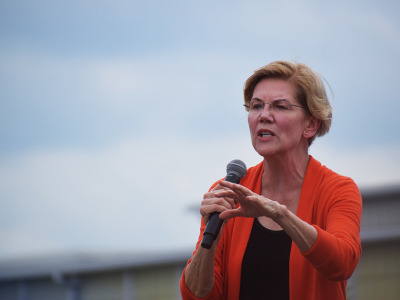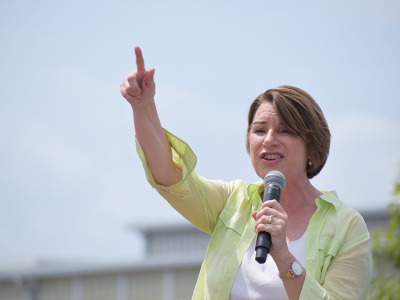Democratic presidential candidates are promising big fixes to the nation’s roads, bridges, and waterways through massive trillion-dollar infrastructure plans but are balking at the idea of raising the federal gasoline tax.
Revenue from the 18.4-cent-per-gallon tax is credited to the Highway Trust Fund to pay for road construction and maintenance and also goes toward mass transit, according to the Congressional Budget Office. The tax rate is not adjusted for inflation and has not been raised since 1993. Had it been raised, CBO said in 2019 the tax would be approximately 15 cents higher.
Another problem for Congress: As cars become more efficient, they use less gas to go the same distance, and motorists pay less into the highway fund. Owners of electric vehicles don't pay the tax at all.
Two presidential contenders voted to raise the gas tax back in 1993 but have a different opinion now.
“I’ve tried this before, we’re not going to be able to raise the gas tax,” former Vice President Joe Biden said at an infrastructure forum in Las Vegas earlier this month.
In order to increase highway funding, Biden would raise $50 billion from other taxes. He said he feels it would be possible to index the gas tax for inflation “down the line” but not now.
“I don’t think we’re going to be able to raise the gas tax from what it is now to what it would be had it been raised for inflation,” Biden argued.
Vermont Sen. Bernie Sanders also voted to increase the gas tax in 1993 when he was in the House of Representatives but does not commit to raising it either. His tax plan would establish an annual tax on people with “extreme wealth,” the top 0.1% of U.S. households.
Sanders’ tax would apply to anyone with a net worth of over $32 million. Someone who has a net worth of less than $32 million would not see their taxes go up at all under this plan, according to his campaign website.

Democratic presidential candidate Elizabeth Warren
Massachusetts Sen. Elizabeth Warren's tax and infrastructure plans make no mention of raising the gas tax. In her tax proposal, she would create a real corporate profits tax and ultra-millionaire tax but not increase the gas tax.
Sanders and Warren did not attend the infrastructure forum in Las Vegas, but California billionaire Tom Steyer did. When the Wall Street Journal reporters who were moderating the town hall asked him if he would raise the gas tax, he said he would look elsewhere for revenue.
“What we are definitely going to have to do is raise taxes, and the question is, is it going to be on consumers or is it going to be on businesses,” Steyer said. His plan would tax big corporations along with creating a wealth tax.
“My goal in this is not to do a regressive consumer tax. (It is) the exact opposite. My goal is to have a much more progressive tax,” Steyer said.
Minnesota Sen. Amy Klobuchar, like the rest of the candidates, does not want to raise the gas tax either.
In order to fund her trillion-dollar infrastructure plan, she would raise the corporate tax rate from 21% to 25%. Increasing the corporate tax rate would generate $100 billion for each percentage point increase, she said. “I would take the first four points of it and get $400 billion out of that,” Klobuchar said.

Democratic presidential candidate Amy Klobuchar
To pay for the rest of her infrastructure plan, she would take the international tax rate to where it was under the Obama administration, a move she said would generate $150 billion, while also approving an infrastructure financing authority.
Interested in more coverage and insights? Receive a free month of Agri-Pulse or Agri-Pulse West by clicking here.
The infrastructure financing authority is a bipartisan proposal by Sens. Mark Warner, D-Va., and Roy Blunt, R-Mo., that would provide loans and loan guarantees to road, bridge, rail, port, water, and sewer projects. Klobuchar also said she would also fund her plan through bonds.
When asked by Agri-Pulse via email if former New York City Mayor Mike Bloomberg supported raising the gas tax, a campaign spokesperson did not directly answer the question.
“These improvements will be fully funded by the revenues raised by his broader tax plan, as well as innovative public-private financing mechanisms,” the spokesperson said.
Bloomberg's tax plan includes proposals like making the capital gains rate equal to the rate for ordinary income for taxpayers above $1 million, closing the 20% pass-through deduction, and raising the corporate tax rate from 21% to 28% while also increasing the minimum tax on foreign income.
Former South Bend, Ind., Mayor Pete Buttigieg argues the gas tax is not a viable long-term funding mechanism for the nation’s highways.
“The reality is, we are going to have to graduate from the gas tax because we are going to have to graduate from gas,” Buttigieg said.
However, Buttigieg noted there is time to make the transition from the gas tax. He said one option could be to have the Department of Transportation create a usage charge system with a vehicle miles traveled fee, but noted data privacy concerns will have to be addressed.
For more news, go to www.Agri-Pulse.com.


